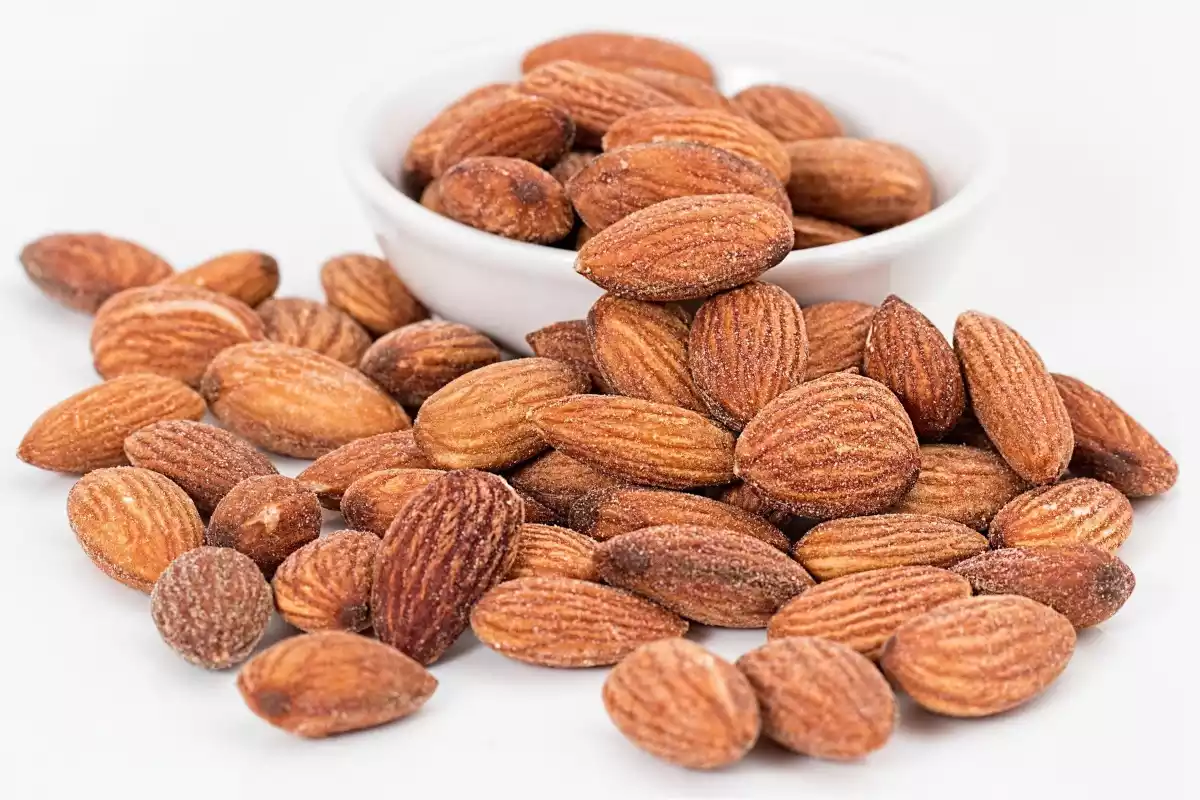Almonds, the seeds of the almond tree, are one of the most popular nuts around the world. They have a great variety of uses (apart from the gastronomic one) and they are as nutritious as tasty. This article will present the main properties and benefits of almonds, as well as their most common uses, like that of almond milk and almond oil, and also some recipes.
The seeds of the almond tree
The almond is a dry fruit that is characteristic of the Mediterranean region, whose origin lies in the eastern Mediterranean and some countries in the Middle East, especially from regions of Syria and Turkey, as well as Pakistan and India. The seeds of the almond tree are known to be covered by a hard shell of brownish colour and porous texture, which in turn is covered by an outer hull of greenish colour and rough texture.
These shells contain a small and elongated seed of about one centimetre long, covered by a coarse skin of brownish colour. So, almonds are one of the nuts that provide more health benefits to the body. Both their nutrients and their natural characteristics, mainly the richness of their kernel, make this fruit very versatile and allow it to be used for other purposes apart from the gastronomic one.
That is to say, almonds are used to prepare food (salads or the almond chicken recipe), to make drinks (like the almond milk), and also desserts (a lot of cookies and cakes). As it is the case with most of the products coming from the East, it is believed that the almond was introduced in Europe during the Classical period due to the trade between Greeks and Romans and other peoples from the eastern Mediterranean and the Middle East. Nowadays, most of the varieties of almonds are found in southern Europe.
The world production
Great part of the varieties of almonds in the world is found mostly in Spain, thanks to the unique characteristics of the southern Mediterranean climate. Thus, it is an important seed for the Mediterranean diet. To a lesser extent, almonds are also cultivated in France, Italy and Iran.

In terms of world production, the largest almond production is found, in the first place, in the United States, with more than 60% of the total. Then, there are Spain, Australia, Italy, Morocco and Iran as other leading producers.
Health benefits
As it was mentioned, almonds are one of the most nutritious nuts, and for this reason, they posses many health benefits. However, you should check if you are allergic to this fruit or if it may be harmful to your organism.
Likewise, as it is the case with any food, you should eat them in moderate amounts and combined with a well-balanced diet, especially the bitter almond, which contains cyanide, whose concentration in the blood is associated with different diseases. Next, we will explain the influence of almonds over the proper functioning of the body, as well as the importance of keeping a healthy and nutritious diet.
1. Cardiovascular health
The regular consumption of almonds provides cardiovascular health benefits. It has been shown that adding this dry fruit to your usual diet reduces the risk of heart diseases, such as heart attacks, strokes and cholesterol. Due to their nutrients (especially minerals and vitamins), almonds are known for balancing blood pressure and helping blood circulation. In fact, the fruit of the almond trees is known as a natural hypotensive.
2. Neurological health
As it is the case with other nuts, the consumption of almonds combined with a well-balanced diet can promote a healthy brain function. The reason for this is that they contain different types of fats and a lot of protein. The regular consumption of this fruit provides nutrients for your brain and your nervous system.
3. Body strengthening and energy
Another benefit is the energy almonds provide to your body for any type of activity, either physical or intellectual. This is due to the fact that 100 grams of almonds contain 579 calories, as well as a great amount of essential nutrients. For example, they are high in minerals like phosphorus, which is good for bone, dental and joint health.

4. Digestion purposes
Since almonds are high in fibre, they have been usually eaten for digestion purposes. In fact, one of their main benefits is their laxative effect, which in particular helps purify the liver. However, this will not happen only by eating almonds, but because there are no underlying diseases and their consumption is regular and integrated in a well-balanced diet.
5. Other benefits of almonds
Other benefits that almonds provide to your body are their high content of vegetable fats, fibre, carbohydrates, vitamins, especially B and E, and also protein and minerals. The almonds’ great nutrient content makes them a superfood, which is why in the last few years the consumption of almond milk has become so popular as a substitute for cow’s milk.
What are almonds good for?
As we have already mentioned, the almond is a dry fruit that has many more uses apart from the gastronomic one. When it comes to the use of almonds as food, their more common gastronomic use can be found in desserts. But not only that, since they are also used for making drinks and salty foods. Among the most common ways to use this nut, you can find:
Almond recipes
Due to their slightly bitter and dry flavour, almonds are used in a great variety of salty recipes. Not only are they ideal for any salad, but they can also be served with pasta or toast. Namely, one of the best known recipes is the almond chicken, which is a stew made with chicken breasts, blanched almonds, carrots, courgettes, onion, chicken broth and soy sauce. There are also almond soups or creams, made by soaking this fruit and then beating it with vegetables.
Pastry-making
It is common for almonds to be used as a main ingredient for a great variety of cakes and desserts. Almonds are especially used for different Christmas cakes and desserts, like nougat or marzipan, and also for all kinds of ice cream. You can also eat them fried or toasted.
Almond milk
This dried fruit is also known to be used for making almond milk, which is a popular drink in many countries, and also for almond cakes. Among the benefits of almond milk, there is the contribution of an important amount of calories, which is low in fatty acids not needed by the organism.
Moreover, its level of protein is similar to that of cow’s milk, but it does not contain lactose (the molecule to which some people are allergic). In addition, this vegetable drink is high in fibre, which makes it very easy to digest. Likewise, almond milk is not only used for consumption, but also for skin care.
Almond oil
Finally, almonds are also used to make cosmetic and skincare products, such as perfumes or moisturizing oils. Among the best known benefits of these fruits of the almond tree, there are the wound healing and anti-inflammatory effects. Therefore, its external use, both as almond oil and almond cream, has many benefits for skin care.
Check out the original article: Almendras: usos, propiedades y beneficios para la salud at viviendolasalud.com
References:
Berryman, C. E.; Preston, A. G.; Karmally, W.; Deckelbaum, R. J.; Kris-Etherton, P. M. (2011). Effects of almond consumption on the reduction of LDL-cholesterol: a discussion of potential mechanisms and future research directions. Nutrition Reviews. 69 (4): 171–85.
Workman, D.(25 July 2017). Top Almonds Exporters by Country in 2016. World's Top Exports.
